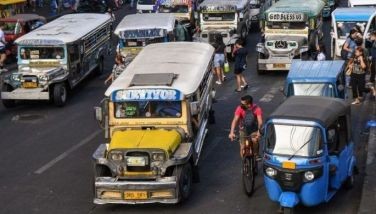UN: 40% of global assets belong to 1% of population
MANILA, Philippines - About 40 percent of global assets belong to the richest one percent of the world’s population, with the bottom half clinging to just one percent, according to a study commissioned by the United Nations.
The study conducted by a group of independent human rights experts appointed by the UN Human Rights Council showed that inequality has increased in most countries and in almost every region for the past decade.
“We live in a very unequal world,†the experts said in the report.
Recent data suggested that the poorest five percent of Americans earn 35 times more than the poorest Zambians. Between 1980 and 2007, the top one percent of Americans nearly tripled their share of total national income from 8 to 23 percent.
In Egypt, women without any education are 24 times as likely to have married before age 15 as those with at least a secondary school education.
Disabled adults make up some 15 percent of the world’s population.
The top 20 percent of the world’s population enjoys more than 70 percent of global income, while the bottom quintile must make do with just two percent.
Experts said that small amounts of redistribution from the very wealthy could effectively eliminate absolute income poverty.
Even after adjusting for relative prices, the poorest five percent of Americans have 12 times more income than the poorest Malians and are richer than 96 percent of Indians.
The distributions of income in Mali and in Denmark do not overlap, suggesting that the richest Malians are poorer than the poorest Danes.
Disability is another common and widely ignored source of inequality.
UNESCO estimates that one-third of the approximately 75 million children who do not attend school suffer some disability.
“Within these marginalized groups women and girls often fare worse than men and boys,†the study said.
On the basis of a thorough review of the evidence on Millennium Development Goals (MDGs) indicators, it shows that they tend to be consistently worse for disadvantaged groups.
“As we enter this crucial phase we must not forget the failures that have left nearly one billion hungry and poverty still rife. The rise of inequality has severely undermined the achievements of the Millennium Development Goals,†the independent experts said.
They likewise recommended making equality a cross-cutting priority for the new development agenda that will take the place of the MDGs.
“Making equality a cross-cutting priority would mean every new goal will confront head on the systemic injustices that drive inequalities, from institutional discrimination against minority groups to uneven investments in social services in different regions of a country,†they noted.
The experts identified social protection as an important part of the policy toolkit for eradicating inequalities, to ensure that the post-2015 agenda leaves no group, community or region behind.
The right to social protection is absolute, therefore should be a goal itself that prioritizes provision for the most disadvantaged and marginalized groups.
“As many as 80 percent of families today have no access to social protection, despite clear evidence that social protection systems can contribute significantly to reducing poverty, creating social cohesion, realizing human rights and protecting people from shocks such as food price spikes,†the UN experts said.
- Latest
- Trending





























